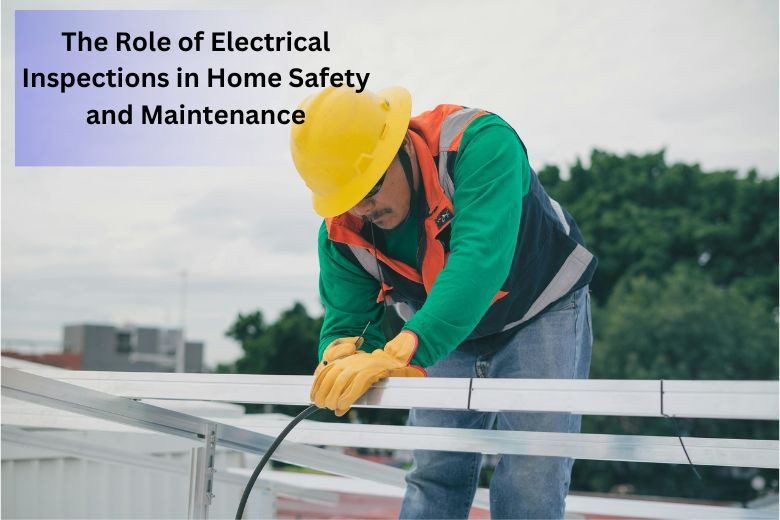The Role of Electrical Inspections in Home Safety and Maintenance
Posted on August 01, 2024 by Admin

Electrical inspections form an integral part of the maintenance of homes in terms of their safety. They ensure that your home's electrical system works reliably and is secure. As an Electrician Service Provider, regular inspections help turn up possible problems before they turn into hazardous and very costly ones, thus maintaining the efficiency of the system.
Must Read : Smart Home Electrical Upgrades: What You Should Know
1. Uncovering Hidden Dangers
These inspections become imperative in detecting the hidden dangers that cannot be perceived by our eyes. Things like faulty wiring, electrical panels that have gone outdated, and connections deteriorating with time may turn out to be serious threats, including electrical fires and shocks. All such issues are found out by the inspection before they start building up into dangerous situations.
Benefits:
- Fire Prevention: Enumerate the issues with open wires or overloading of circuits that could cause breakout of fire.
- Prevention of Shock: Potentials of risks because of faulty wiring and defective earthing are expected.
2. Compliance to Safety Codes
All electrical codes and standards are revised for change to ensure better safety. Inspection ensures adaptation of the system to these codes and regulations of the home. More importantly, it is done regarding the older homes, which do not stand up to the level of safety expected today.
Must Read : Common Electrical Problems in Older Homes and How to Fix Them
Benefits:
- Adherence to Codes: Check whether your system does indeed comply with the present safety standards.
- Insurance Requirements: Most of the insurance policies require proof of code compliance for coverage.
3. Better Performance of a System
Regular inspections will keep your electrical system efficient in operations. An electrician will thus be able to identify and rectify problems that may be the cause of inefficient operations or a higher consumption of energy. This might then cut down energy bills and promote better system performance.
Benefits:
- Energy Efficiency: Fine-tune your system for minimal energy wastage.
- Long Life: Lengthen electrical component life by catching issues early before serious failures develop.
Must Read : How to Choose the Right Electrician for Your Home
4. Planning Upgrades and Renovations
Unless one is doing renovations or upgrades at a location, the electrical inspection cannot be overemphasized. This shall ensure that your current system supports additional loads and guides planning on upgrades that might be necessary to avoid headaches during a construction project. Basically, the same inspection makes sure that new installations are safe and compatible.
Benefits:
- Renovate Safely: Know in advance any electrical changes that may be required before work commences.
- Ready for the Future: Be prepared for the next upgrade or further system expansions.
5. Peace of Mind Provided
These periodic routine electrical inspections give peace of mind, knowing that you have a safe and reliable system. As an Electrician Service Provider, this puts your heart at ease within your home and reduces the occurrence of very unpleasant surprises in the near or distant future.
Benefits:
- Safety Assurance: Be assured that your home has been safely guarded against electrical hazards.
- Routine Maintenance: Periodically work an inspection into a general home maintenance program.
Faqs
-
1. How often should my home electrical system be inspected?
Any electrical system should have an inspection every 5 to 10 years. Still, if you experience frequent electrical problems of tripped circuit breakers or flickering lights or if you live in an older home, more frequent inspections might be due. Regular inspections avoid potential issues becoming major problems.
-
2. What to Expect During an Electrical Inspection?
An electrician will inspect the wiring, outlets, circuit breakers, and electrical panel. He is going to check the system for any wear or damages in regard to the right safety codes of today. They test the performance of your electrical system. The electrician, at the end of an inspection, is going to give a report detailing problems found and the necessary repairs or upgrades that are required.
-
3. . Am I allowed to do the electrical inspection myself, or am I supposed to avail the services of someone who is licensed to conduct an electrical inspection?
Though it can be argued that most small electrical works are very easy to undertake and quite easily performed by any householder, electrical inspection is a totally different matter altogether. An electrician has the schooling and instrumentation to handle an assessment of your system, turning up any possible danger or code issues that might be in your home and pose a risk to it or your family. Without proper knowledge, repairing and inspecting any electrical systems are dangerous and might bring more problems or safety risks.
Recent Post
- Top Plumbing Service Providers in Arizona, USA
- Top 10 Electrician Service Providers in Alabama, USA
- Top 20 Roof Repair Service Providers in Alabama, USA
- The Role of Roof Insulation in Energy Efficiency: Tips and Tricks
- Understanding Roof Damage from Wildlife and How to Prevent It
- How to Choose the Best Roofing Contractor for Emergency Repairs
- Roofing Maintenance for Historic Homes: Preserving Architectural Integrity
- The Importance of Proper Attic Ventilation for Roof Health
- How to Identify and Prevent Roof Mold and Mildew
- The Best Practices for Removing Snow from Your Roof